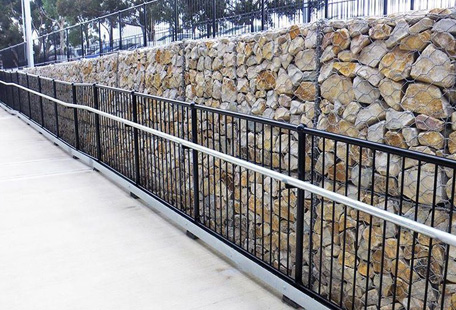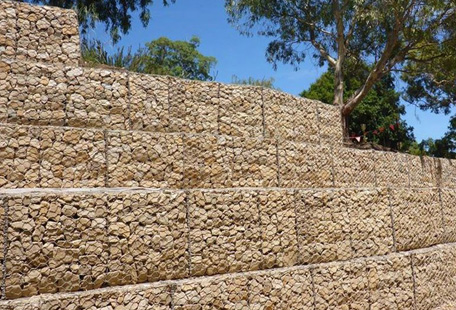How To Build A Gabion Retaining Wall?
The limits of height you can build a gabion rock retaining is really only limited to your needs. Gabion baskets can be used to divide or step gardens by as little as 300mm or can be used to build a side of a house. It all comes down to stability and above a certain height, engineering approval. Find out more detail on considerations of how high you can build a retaining wall here.
Here are 4 common approaches to think about when determining the height of your rock retaining wall:
1. Add additional baskets to increase the depth of the wall.
This increases the surface area of the base of the wall on the ground which reduces the opportunity for the wall to sway or collapse. The recommended ratio is 2 baskets high to every 1 basket deep.
Gabion Basket
2. Install support posts.
Support posts help add stability to your wall to also reduce the risk of collapse. They need to be strong enough to properly support the gabions and should be secured in a concrete slab underneath the basket wall. The stabilizers can be threaded through the openings in the baskets to create rigidity by interlocking the baskets together. The recommended spacing between the support posts is 1m.
3. Step your wall.
Stepping your retaining wall will add stability and have provided a stepped look rather than a flush look for your wall. Gabion walls with a stepped front face shall have a minimum 150 mm horizontal setback for each 500 mm vertical lift.
4. Slope your wall.
Sloping your wall back into the incline of the hill will help add stability to the wall. The recommended incline is between 6 and 10 degrees. Compacting of soil under the base will be required. This is not recommended for retaining walls greater than 5m in height.
Gabion Wall
Increased customization
Here's a good example: Say you wanted to build a achieve a 2m long gabion rock wall that is 300mm deep and 500mm high. Rather than trying to achieve this with one large basket, we can use a combination of different standard panel sizes as follows:
4 off 1000x500mm panels (acting as the front and back facing panels)
4 off 1000x300mm panels (acting as the bottom and top facing panels)
3 off 500x300mm panels (acting as the 2 end panels and 1 center panel)
Rather than try and handle one 2m monster basket, you can build this in situ one panel at a time. Notice how the 1 off 500x300mm panel is used as a central panel? This means that this setup is more cost-effective than buying 2 individual baskets butted up together because one end panel is now redundant. It also ties all the other panels together nicely with the spiral winder (not shown).
Reducing gabion bulging
Smaller gabion baskets installed on top of one another allow for center support that runs horizontally through the middle of your retaining wall. This ensures your rock filling stays consistent throughout the basket, preventing bellowing. Over time, rock filling cannot slowly sink deeper into the basket causing bellowing due to the weight and pressure of the rock. The larger the basket, the more likely bellowing is to happen because the less wire mesh is available to support it. Such an effect will eventually destroy the shape of the wall and its functionality.



评论
发表评论